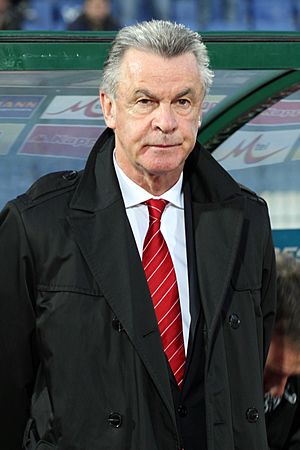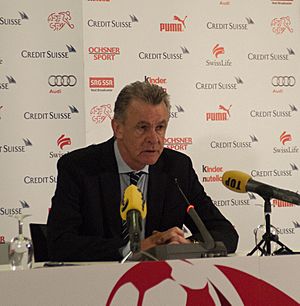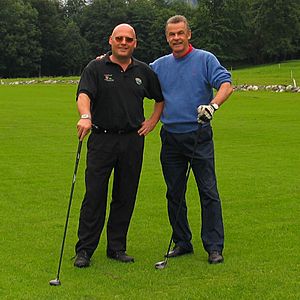Ottmar Hitzfeld facts for kids

Hitzfeld coaching Switzerland in 2011
|
|||
| Personal information | |||
|---|---|---|---|
| Date of birth | 12 January 1949 | ||
| Place of birth | Lörrach, Germany | ||
| Height | 1.78 m (5 ft 10 in) | ||
| Position(s) | Forward | ||
| Youth career | |||
| 1960–1967 | TuS Stetten | ||
| 1967–1968 | FV Lörrach | ||
| Senior career* | |||
| Years | Team | Apps | (Gls) |
| 1971–1975 | Basel | 92 | (66) |
| 1975–1978 | VfB Stuttgart | 80 | (38) |
| 1978–1980 | Lugano | 55 | (35) |
| 1980–1983 | Luzern | 72 | (30) |
| Total | 300 | (169) | |
| International career | |||
| 1972 | West Germany (Olympic) | 6 | (5) |
| Managerial career | |||
| 1983–1984 | SC Zug | ||
| 1984–1988 | Aarau | ||
| 1988–1991 | Grasshoppers | ||
| 1991–1997 | Borussia Dortmund | ||
| 1998–2004 | Bayern Munich | ||
| 2007–2008 | Bayern Munich | ||
| 2008–2014 | Switzerland | ||
| *Club domestic league appearances and goals | |||
Ottmar Hitzfeld (born 12 January 1949) is a famous German former football player and manager. He won an amazing 18 major titles during his career. Most of these wins happened when he was with Grasshopper Club Zürich, Borussia Dortmund, and Bayern Munich.
As a player, Hitzfeld was a striker. He won two Swiss Super League titles with Basel in 1972 and 1973. He was even the top goal scorer in the league in the 1972–73 season. He also played six games for the West Germany national team at the 1972 Summer Olympics.
Ottmar Hitzfeld studied mathematics and was a sports teacher. He is known as one of the most successful coaches in German and international football. As a manager, he won two Bundesliga titles with Dortmund and five with Bayern Munich. He also won the UEFA Champions League twice, once with Dortmund in 1997 and again with Bayern in 2001.
He has been named "World Coach of the Year" twice. He is also one of only seven managers to win the European Cup/UEFA Champions League with two different clubs. This shows how truly special his coaching career was.
Contents
Playing Football: Early Years
Ottmar Hitzfeld was born in Lörrach, Germany. He started playing football in the late 1960s for local German teams. These were TuS Stetten and FV Lörrach. His talent soon caught the eye of FC Basel, a top Swiss team.
He joined Basel in 1971. As a forward, he helped the club win the Swiss championship in 1972 and 1973. In 1973, he was the top scorer in Switzerland. He also won the Swiss Cup with Basel in 1975.
In 1973, while playing for Basel, he finished college. He became a teacher of mathematics and sports. He kept his amateur status so he could play in the 1972 Summer Olympics in Munich. There, he played alongside Uli Hoeneß, who later became a key figure at Bayern Munich. Hitzfeld scored five goals in that tournament.
In 1975, Hitzfeld joined VfB Stuttgart in Germany's second division. He was part of a team that scored many goals. In one game, he scored six goals, which is still a record for a 2. Bundesliga player. After two years, in 1977, his team moved up to the top division, the Bundesliga. He scored 33 goals in 55 league games for Stuttgart. After three years, Hitzfeld returned to Switzerland. He played for FC Lugano and then FC Luzern. He ended his playing career in 1983 at age 34.
Coaching Career: Swiss Success
Starting in Switzerland (1983–1991)
In the summer of 1983, Hitzfeld began his coaching journey. He signed his first contract with SC Zug in Switzerland's second football league. His team won the Nationalliga B championship in the 1983–84 season. This meant they were promoted to the top league, the Nationalliga A. This was the first and only time in the club's history.
In 1984, he moved to coach FC Aarau. He stayed there for four years. His time at Aarau was successful, as he won his first title as a coach: the 1985 Swiss Cup. Soon, bigger Swiss clubs noticed him.
He then joined Grasshopper in Zürich in 1988. Between 1988 and 1991, he won four more trophies with them. He won the Swiss Cup again in his first season. The next year, he won both the league and the cup. He finished his time there by winning the Swiss Championship again in 1991.
Coaching in Germany: Dortmund and Bayern
Borussia Dortmund (1991–1998)
In 1991, Hitzfeld became the manager of Borussia Dortmund, a club in the German Bundesliga. In his first year, his team finished second in the league. This earned them a spot in the 1992–93 UEFA Cup. The next season, Dortmund reached the final of this competition. However, they lost both matches to Juventus.
In 1995, he won his first Bundesliga title with Dortmund. This was the club's first major trophy since 1989. In 1995–96, they successfully defended their title. The biggest win came in 1997. Dortmund finished third in the league but reached the UEFA Champions League final. They faced Juventus again. This time, Borussia Dortmund won 3–1 in Munich.
Because of this success, Hitzfeld was named "World Coach of the Year" for the first time. After this, he moved to a sports manager role at the club. He had a record of 144 wins, 63 draws, and 65 losses with Dortmund.
Bayern Munich (1998–2008)
First Time at Bayern (1998–2004)
In 1998, Hitzfeld was hired by Bayern Munich, Germany's most successful club. In his first year, he led the club to win the league title by a huge 15-point lead. However, they lost the German Cup final. The most memorable part of that season was their run to the Champions League final. Bayern lost dramatically to Manchester United, who scored two goals in injury time.
In the next season, Bayern won the double (both the league and the cup). They won the league on the very last day. They also won the German Cup final against Werder Bremen. In the Champions League, Bayern reached the semi-finals but lost to Real Madrid.
In the 2000–01 season, Hitzfeld led Bayern to win the league championship for the third time in a row. They also reached the Champions League final again. This time, Bayern won after a penalty shootout against Valencia. This made Hitzfeld only the second coach to win the Champions League with two different teams.
He was again named "World Coach of the Year." His team then won the 2001 Intercontinental Cup against Boca Juniors. In the 2002–03 season, Bayern again dominated German football. They won the league title with four games to spare. They also won another double by winning the German Cup.
The 2003–04 season was not as successful. Bayern did not win any titles. They finished second in the league and were knocked out of the cups. Because of this, the club decided to let Hitzfeld go. His last match was a 2–0 win against SC Freiburg on 22 May 2004. He finished his first time at Bayern with 193 wins, 73 draws, and 53 losses.
Second Time at Bayern (2007–2008)
Hitzfeld took a break from football after leaving Bayern. On 1 February 2007, he returned to Bayern Munich after the previous coach was let go. He tried to lead Bayern to another championship, but they finished fourth. This meant they did not qualify for the Champions League for the first time in over ten years.
Before the next season, Bayern spent a lot of money on new players. This helped Hitzfeld lead the club to more success in Germany. They won the German League Cup, the German Cup, and the league championship. In the UEFA Cup, Bayern reached the semi-finals but lost badly to Zenit St. Petersburg. Hitzfeld had already announced he would leave Bayern after this season. His last match was a 4–1 win against Hertha BSC.
Coaching the Swiss National Team (2008–2014)
Hitzfeld became the coach of the Swiss national team in the summer of 2008. His first game was a 4–1 win against Cyprus. His first official match was a 2–2 draw against Israel in a qualifying game for the 2010 FIFA World Cup. Switzerland finished first in their qualifying group and reached the 2010 FIFA World Cup in South Africa.
At the 2010 World Cup, Switzerland won their first game 1–0 against Spain, who later became champions. However, they lost to Chile and drew with Honduras. This meant they did not move past the group stage.
Switzerland did not qualify for Euro 2012. They finished third in their qualifying group. Hitzfeld then led Switzerland to qualify for a second straight FIFA World Cup. His team did not lose any games during the qualifying campaign. On 17 October 2013, Hitzfeld announced he would retire after the 2014 FIFA World Cup.
At the 2014 World Cup, Switzerland finished second in their group. Hitzfeld's final match as a coach was a 1–0 loss in extra time against Argentina in the round of 16 on 1 July 2014. Vladimir Petković took over as the Swiss coach.
Retirement
Ottmar Hitzfeld officially retired from coaching after the 2014 World Cup. He had been offered a very large contract to coach a team in China, but he decided to turn it down. He said that after leaving Bayern in 2004, he felt "burnt out" and "a bit depressed." He needed two years to recover. He then had "the best years at Bayern" when he returned.
Personal Life
Ottmar Hitzfeld grew up in Lörrach, Germany, near the Swiss border. He is the youngest of five children. He is married to Beatrix Hitzfeld. They have one child and three grandchildren.
There is a football field named after him, the Ottmar Hitzfeld Arena. It is the highest football field in Europe.
Honours and Awards
Player Achievements
- Basel
- Swiss Super League: 1971–72, 1972–73
- Swiss Cup: 1975
- Individual Awards
- Swiss Super League top goalscorer: 1972–73 (18 goals)
Manager Achievements
- SC Zug
- Nationalliga B champions: 1983–84
- Aarau
- Swiss Cup: 1985
- Grasshopper
- Swiss Super League: 1989–90, 1990–91
- Swiss Cup: 1988–89, 1989–90
- Swiss Super Cup: 1989
- Borussia Dortmund
- Bundesliga: 1994–95, 1995–96
- DFB-Supercup: 1995, 1996
- UEFA Champions League: 1996–97
- UEFA Cup runner-up: 1993
- Bayern Munich
- Bundesliga: 1998–99, 1999–2000, 2000–01, 2002–03, 2007–08
- DFB-Pokal: 1999–2000, 2002–03, 2007–08
- DFB-Ligapokal: 1998, 1999, 2000, 2007
- UEFA Champions League: 2000–01; runner-up: 1998–99
- Intercontinental Cup: 2001
- Individual Awards
- German Football Manager of the Year: 2008
- IFFHS World's Best Club Coach: 1997, 2001
- World Soccer Magazine World Manager of the Year: 1997
- UEFA Coach of the Year: 2001
See also
 In Spanish: Ottmar Hitzfeld para niños
In Spanish: Ottmar Hitzfeld para niños
 | John T. Biggers |
 | Thomas Blackshear |
 | Mark Bradford |
 | Beverly Buchanan |



